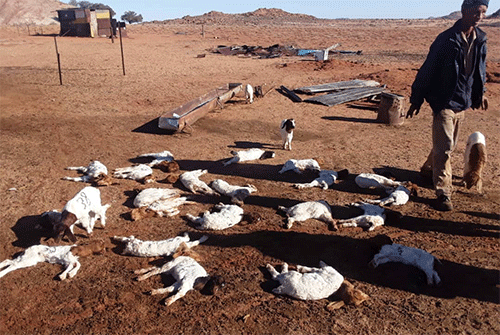AUS – Following extreme cold weather conditions, farmers in the vicinity of Aus settlement in the //Kharas region lost up to 150 sheep and goats.
The cold front was accompanied by strong winds and rains.
New Era interviewed one of them, probing into what financial implications this dilemma could have on him.
John Boois derives his livelihood solely from farming.
Boois who resides on a communal resettlement farm with other resettled farmers, lost a total of 56 sheep and goats.
“It was indeed a setback for me as these animals are all I can rely on to put bread on the table,” Boois lamented.
He continued that despite the loss, he finds solace in the fact that not all of his 184 small livestock died during the extreme weather conditions experienced recently.
“I cannot sit back and perish from poverty but must now move forward with my farming activities in efforts to multiply my small livestock numbers, I will remain positive on the outlook for the future,” he optimistically remarked.
To avoid the incident from reoccurring should such a disaster strike again, the farmer said he will erect protective structures for his animals.
“Once these winds subside, I will definitely start implementing such measures,” he said.
Apart from a government official taking photos of the scene of dead animals, there is no indication yet on whether he will receive assistance of any kind from the government, Boois said.
The farmer is also not aware of the recently-introduced measures by government to assist farmers in drought-stricken areas in the //Kharas region.
The measures include incentives for selling some of their animals before losing all and assistance when they are moving their livestock to better gracing areas.
Boois said he will visit the respective public office about it should the need arise accordingly.
In a recent New Era article, in !Namin#Nus constituency (where Aus resorts), constituency councillor Susan Ndjaleka said her office was cognisant of the disaster.
She added that the Office of the Prime Minister has requested //Kharas regional council to carry out a risk assessment and forward such a report to the agency in order to explore ways how to assist these farmers with their losses.
Ndajaleka, upon enquiry, confirmed the assessment was underway.
– sklukowski@nepc.com.na


